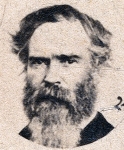Samuel Lecompte, the slaveholding Chief Justice of Kansas Territory, instructed his grand jury about treasonable behavior. If anybody in Kansas did something so wild as placing themselves in opposition to and resisting the laws of the territory, then they resisted the laws of the United States too. That made them traitors and the jurors must act even if they had no evidence that treasonable action had occurred. Organization and intent to resist counted just as much. The judge went so far as to practically order his grand jury to indict free state leaders by name, running down a list of the offices they occupied in the wildcat government. They acted accordingly, ordering the arrest of the free state leadership.
In itself, that made for a tremendous attack on the free state movement. Jailed leaders would have a difficult time leading anything. They would face considerable personal danger, both from the results of legal process and any convenient accidents that might transpire. The mere fact of their imprisonment might deter support from elsewhere in the nation, as it would then necessitate collision of a kind with the authority of the United States. But the grand jury did one better than that. It found
that the newspaper known as The Herald of Freedom, published at the town of Lawrence, has from time to time issued publications of the most inflammatory and seditious character, denying the legality of the territorial authorities, addressing and commanding forcible resistance to the same, demoralizing the public mind, and rendering life and property unsafe, even to the extent of advising assassination as a last resort
George Brown’s paper had done all of that, with the possible exception of the assassination business. So had The Kansas Free State, with whom he often feuded. The grand jury advised “their abatement as a nuisance.” In other words, the law should shut them down. The nineteenth century didn’t have our First Amendment scruples. People across the political spectrum agreed that speech of certain sorts did not suit public order and deserved suppression, much as some of us still believe of what we consider obscenity. Under that theory, southern states had often acted to keep antislavery publications from circulating.
Furthermore:
we are satisfied that the building known as the ‘Free-State Hotel’ in Lawrence has been constructed with the view to military occupation and defence, regularly parapeted and portholed for the use of cannon and small arms, and could only have been designed as a stronghold of resistance to law, thereby endangering the public safety, and encouraging rebellion and sedition in this country; and respectfully recommend that steps be taken whereby this nuisance may be removed.
I don’t recall seeing that claim except in proslavery sources, but given that the free state men had erected earthworks in Lawrence and used the hotel as a redoubt back in December, it sounds reasonable.
All of this comes together for a comprehensive program of suppression. The proslavery party would arrest the leaders of the opposition. In the nineteenth century, newspaper editors served as important agents for political parties too. Thus the papers must go as well. Then the proslavery side would take even the means of armed resistance away. A majority of Kansans might still oppose them, but without leaders or a voice to organize that resistance they could not hope to prevail.

You must be logged in to post a comment.